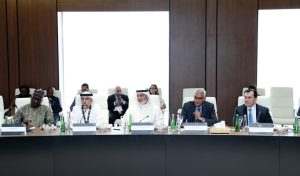ABU DHABI / WAM
Suhail bin Mohammed Al Mazrouei, Minister of Energy and Infrastructure, has affirmed the need for national oil companies to embrace sustainable practices by integrating renewable energy sources, such as solar and wind power, into their operations.
He made this statement during a session held during the Abu Dhabi International Petroleum Exhibition and Conference (Adipec) 2023, where energy ministers, decision-makers, and experts explored how national oil companies’ business models are evolving to achieve lower carbon footprints, while operating successfully in a decarbonised economy. The meeting was led by Suhail bin Mohammed Al Mazrouei and Haitham Al Ghais, Opec Secretary-General.
“A prime example is Abu Dhabi National Oil Company (Adnoc) which has a robust decarbonisation plan towards achieving its net-zero commitment by 2045. It is the first company among its peers to make such a commitment, reinforcing its position as a responsible energy provider,” Al Mazroeui added.
He encouraged national oil companies to focus on improving energy efficiency across their value chains, from extraction and processing to distribution and refining. Implementing advanced technologies and practices, such as digitalisation and process optimisation, can help reduce energy consumption and related emissions. Al Mazrouei added, “As national oil companies strive to achieve a lower carbon footprint, it is imperative for stakeholders to collaborate in devising a sustainable pathway. By evolving business models, investing in climate technologies, and fostering stakeholder collaboration, these companies can contribute significantly to global efforts in achieving a lower-carbon energy system.”
“The 2050-2060 future for oil companies should envision a diversified energy portfolio, increased energy efficiency, and a strong commitment to reducing GHG emissions.”
In addition, the Minister called on oil companies to prioritise the reduction of methane emissions, a potent greenhouse gas, throughout their value chains. He noted that this can be done by implementing best practices, such as improved monitoring and leak detection technologies, that can significantly contribute to lowering methane emissions.
He said, “The UAE’s zero flaring policy was a major milestone on the country’s path to reduce methane emissions. Our priority to reduce methane emissions received a major push when Adnoc pledged to achieve zero methane emissions by 2030.”
Al Mazrouei urged national oil companies all over the world to embrace sustainability principles and become part of the solution to the global climate and energy challenges.
For his part, Haitham Al Ghais, Opec Secretary-General, stressed that national oil companies should be proud of their positive contributions to global energy security, energy affordability, and emissions reduction, which are integral components of the energy sustainability trilemma.
The Opec Secretary-General underlined that focusing on one aspect of the trilemma, while neglecting the others, will lead to undesired consequences and chaos. He noted that the world will continue to require the energy stability and availability that oil has provided for decades.
 The Gulf Time Newspaper One of the finest business newspapers in the UAE brought to you by our professional writers and editors.
The Gulf Time Newspaper One of the finest business newspapers in the UAE brought to you by our professional writers and editors.
